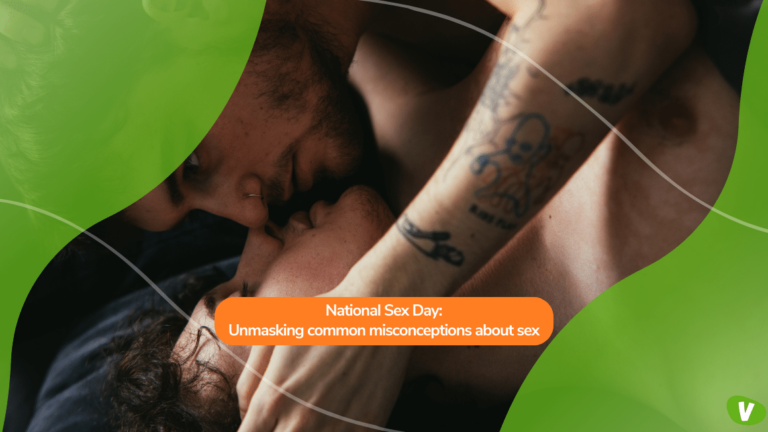What are your beliefs about sex, and where did you learn them?
Many learn about sex and sexual relationships through friends, media, and society. However, have you ever stopped to question how true these beliefs are? You might have picked up one or two false ideas over the years.
- Top misconceptions about sex
- Communication and why it’s essential in sexual relationships
- Strategies to promote safe, respectful, and consensual sex
- Negative sexual stereotypes and how they’re harmful
- Overcoming shame and guilt associated with sexual desire and preferences
- The takeaway
To celebrate National Sex Day, we’re unmasking common misconceptions about sex to ensure our readers have accurate and science-based facts at their disposal.
Ready to celebrate? Let’s get to it.
Top misconceptions about sex
When you start investigating, society has a lot of misconceptions surrounding sex. Here are the most common false statements we’ve found:
- You can’t get pregnant while menstruating. While unlikely, if you have unprotected sex during your period, there’s a slight chance you could get pregnant (if you have a short menstrual cycle).
- If you need lubricant, you’re not aroused. Many factors affect vaginal lubrication, not only arousal. For example, illness, menstrual cycle, menopause, illness, and more.
- All women can orgasm from vaginal sex. Not true. Studies show that approximately 75% of women don’t orgasm through vaginal sex alone.
- Condoms make sex worse. This is a very harmful myth. Studies have shown that participants rate condom sex as enjoyable as unprotected sex. You can also experiment with different condoms in all colours, textures, and thicknesses.
- You can’t become pregnant from pre-cum. Sperm can leak into pre-cum, and this can result in a pregnancy.
- Sex burns many calories and helps with weight loss. While sex burns calories, it’s not enough to generate profound weight loss. Approximately 85 – 150 calories are burned in thirty minutes of sex. 3,500 calories must be burned to lose a pound.
- Anal and oral sex are safer than vaginal sex. These sexual practices may not cause pregnancy, but they still come with risks, such as STIs.
How do these misconceptions impact our understanding of sex?
Many of society’s common misconceptions about sex lead to unsafe sexual situations, especially concerning pregnancy and STIs. With so many myths promoting unprotected sex, it can be tempting to forgo contraception and protection. However, there’s no scientific data to prove these myths!
These myths can also lead to an unfulfilling sex life for all genders. For example, women often go without orgasm because they believe they should be able to climax from vaginal stimulation – unfair, to say the least.
Science-backed facts to debunk these common misconceptions about sex
Want some proof against the misconceptions? Here are some quick facts to use when you hear these misconceptions:
- The “pull out” can result in pregnancy and has a 4% failure rate (condoms have a 2% failure rate)
- Studies by PubMed Medical found sperm present in pre-cum of 17% of male participants
- The Journal of Sex and Marital Therapy found 37% of women need non-vaginal stimulation to achieve an orgasm
- There aren’t any studies that link porn consumption to erectile dysfunction
Use these to debunk and educate our loved ones.

Communication and why it’s essential in sexual relationships
Communication allows both partners to express their preferences, desires, and boundaries. This open channel of communication promotes understanding, and it can help to build trust in intimate situations.
Being transparent and upfront also allows you to set safe boundaries. These are essential in any sexual relationship, especially when exploring new kinks or fantasies.
How communication enhances intimacy
If you want to build your intimacy, open communication is a must. This creates a safe space for both partners to feel heard and seen. Constant open communication leads to a stronger emotional connection, quickly translating into a stronger physical connection and a better sex life.
Of course, building this trust takes time. But you can elevate intimacy with honest communication and upholding each other’s boundaries.
Strategies to promote safe, respectful, and consensual sex
For National Sex Day, we’re focusing on promoting safe, respectful, and consensual sex. Everybody deserves a great sex life, and these are some strategies you can use to get started:
- Educate yourself and others on consent, sexual health, and boundaries
- Create an open dialogue with your partner and close friends to share your knowledge
- Always discuss consent, expectations, and boundaries before sex
- Champion clear communication
- Regularly discuss STI testing and contraception to stay sexually healthy
Negative sexual stereotypes and how they’re harmful
Negative or false, sexual stereotypes spread much harm through society, and they might even harm your sex life.
These stereotypes and misconceptions reinforce rigid expectations and remove the ability for personal preference and individual sexual enjoyment. They also contribute to reducing people to sexual stereotypes, which can be hard to shake off or ignore.
Negative stereotypes also lead to some people feeling low self-esteem or experiencing low body confidence. They can also lead to sexual harassment and violence towards certain population groups.
Dismantling harmful sex narratives
To start dismantling these harmful sexual beliefs, we need to challenge and talk about the common sexual misconceptions.
This can be done through better sex education in schools or within adult communities. It can also happen if we discuss the issues more. Whether you join an organisation or talk to your friends about the myths, standing up to them and talking about them out loud is a crucial step to removing them.

Overcoming shame and guilt associated with sexual desire and preferences
Due to the many misconceptions in our society, many associate guilt and shame with sex. Luckily, you can take steps to remove these negative feelings from your sex life.
Remember that sexual desires vary, and that’s normal. There’s no “right” way to feel or be when it comes to sex. Experimentation is excellent and should be encouraged.
Learning about consent and having the choice to say no is also very empowering. You don’t ever have to do anything you don’t want to. Taking your sex life into your own hands via consent and boundaries can help you remove guilt from the act.
How to foster a healthy sex life and improve your sexual well-being
Once you overcome any negative feelings surrounding sex, you can also start building healthy habits to improve your sex life and well-being.
For example, listening to your desires and discussing them with your partner can make sex even more exciting. You should also always listen to your partner’s wishes. Two-way communication and respect are essential for fostering healthy sexual practices.
Self-compassion is also needed. If any negative feelings arise, listen to them, and sit with them. Don’t force yourself to push through them just for your partner.
The takeaway
How will you celebrate National Sex Day?
Whatever you get up to, actively try building healthy sexual habits. From listening to your partner to debunking any common misconceptions about sex in conversation, it’s time to stand up for the truth.
Start your sex education journey today. Learn more from our sex positive-blog here.





